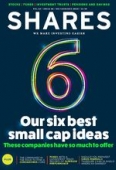Archived article
Please note that tax, investment, pension and ISA rules can change and the information and any views contained in this article may now be inaccurate.
Surging stock prices mask concerns about a US economic slowdown

Despite the recent stellar share price performance of ‘new economy’ stocks such as Amazon, Apple and Tesla, and an unexpectedly strong reading for the January US manufacturing Purchasing Managers’ Index (PMI) data, there is mounting evidence that the underlying US economy is slowing. This suggests that investors might want to pause before they pour money into US shares at current prices.
The share price rallies for Amazon, Apple and Tesla have added hundreds of billions of dollars to the value of the US stock market in recent months, sustaining the bullish narrative and helping to propel both the S&P 500 and the Nasdaq Composite index to fresh highs this year.
In addition, January’s headline PMI of 50.9% was way above market expectations and the December reading of 47.8%. The index takes responses from purchasing managers across US industry and measures the percentage of respondents who are more positive on the economy this month than last month plus half of those who say conditions are the same as last month. A reading above 50% is generally considered ‘expansionary’.
However, January’s reading contrasted sharply with the trend of the last six months and with other surveys such as the Chicago Business Barometer, which last month fell to its lowest level since December 2015. Whereas eight out of 10 PMI components were higher, all five Chicago components were lower.
New orders falling, jobless claims rising
The Chicago survey showed order backlogs at a four-year low last month, while the new orders index and the employment index were also well below the 50-point level considered to be ‘expansionary’.
Although the PMI new orders component was higher, comments from industrial managers gave cause for concern. ‘Lack of faith in the economy seems to be why we cannot sell capital projects’ was the view of one machinery maker, while transportation firms reported continued signs of slowdown in manufacturing and energy firms said ‘our customer slowdown has not reached the bottom’.
The PMI showed temporary labour is still in short supply, yet four out of six industrial sectors registered a fall in hiring in January continuing the downward trend of the last six months. Meanwhile weekly initial jobless claims are no longer falling and recently spiked to 250,000 against a previous average of around 210,000. Economists at UBS expect claims of 250,000 to be more frequent from now on.
Consumption slowing
US real GDP grew at an annual rate of 2.1% in the last quarter, continuing the slowdown seen over the last 18 months. One of the key factors was a slowdown in consumer spending to an annual rate of 1.8% from 2.6% in the third quarter.
Fourth quarter updates from retailers haven’t been encouraging with Best Buy, JC Penney, Kohl’s, L Brands, Macy’s and even Target reporting worse than expected sales, suggesting that consumers are feeling less positive than they have been. The health of the US economy is highly dependent on consumers continuing to spend.
Construction spending down
Spending on US construction projects fell by 0.2% in December against estimates of a 0.6% rise as lower investment in offices and public works offset a rise in residential building.
Last week the world’s biggest construction and mining equipment manufacturer Caterpillar cut its 2020 earnings guidance fairly drastically. Analysts were already cautious about the outlook, forecasting adjusted profits of $10.63 per share against $11.06 last year, but the company said it expects earnings per share of between $8.50 and $10 for the current year.
Sales in the fourth quarter were down 8% due to lower than expected end-user demand, and the company expects continued global economic uncertainty to pressure sales to users in 2020 and cause dealers to further reduce inventories.
Weaker 2020 outlook
Similarly UPS, the world’s number one parcel delivery firm, announced 2020 earnings targets well below market forecasts due to expected weakness on the industrial side of the US together with measures to cut costs and improve competitiveness.
In its fourth quarter update it also cited lower parcel volumes ‘into and out of the UK and on the Asia-US lane’, the former due to political and economic uncertainty in the UK and the latter due to the effects of the tariff war between the US and China.
While the trade spat seems to have quietened down for now with a truce covering certain goods, the outbreak of coronavirus has undoubtedly made the outlook for the global economy less clear.
China adds to uncertainty
Investment bank UBS has slashed this year’s growth forecast for the Chinese economy due to the economic lockdown caused by the virus. Oxford Economics has reduced its estimate of Chinese real private consumption growth this quarter from 6.8% to 1.1%, with lunar New Year holiday spending seen well below last year’s $140bn as aircraft, hotels, restaurants and cinemas sit empty.
There are even reports that the Chinese government will reduce its official growth forecast from its current range of 6% to 6.5%.
This means the US economy is facing twin headwinds of slowing domestic demand and a decrease in global growth.
Important information:
These articles are provided by Shares magazine which is published by AJ Bell Media, a part of AJ Bell. Shares is not written by AJ Bell.
Shares is provided for your general information and use and is not a personal recommendation to invest. It is not intended to be relied upon by you in making or not making any investment decisions. The investments referred to in these articles will not be suitable for all investors. If in doubt please seek appropriate independent financial advice.
Investors acting on the information in these articles do so at their own risk and AJ Bell Media and its staff do not accept liability for losses suffered by investors as a result of their investment decisions.
Issue contents
Education
Exchange-Traded Funds
Feature
Great Ideas
Great Ideas Update
Money Matters
News
- China trusts under pressure from coronavirus fears
- Sales growth challenges weigh on Diageo and Unilever shares
- The key challenges facing new BP boss
- Surging stock prices mask concerns about a US economic slowdown
- The companies in the race to find a coronavirus cure
- Burford Capital shares gain despite earnings warnings

 magazine
magazine











